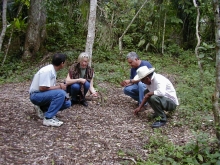Regional settlement distribution, local community subsistence patterns, and individual household organization of the Ancient Maya provide material evidence for the evolution of sustainable economies, social interactions, and political relations in the Maya forest. Archaeological research of the ancient Maya, ethnohistorical research, and contemporary anthropological investigations of traditional communities underscore the complexity of interrelationships between cultural systems and their environment over time. These patterns and interpretations have important implications when we consider the future of the Maya forest and the people who occupy the area today.
The BRASS/El Pilar Program is rooted in the anthropological study of the human/ environment relationship. It draws on the foundation of cultural ecology, interpreting evolutionary changes in strategies for survival. The composition of the Maya forest today exhibits the imprint of ancient human habitation and resource management. This resource relationship is characterized in the Mayan language among contemporary farmers and underscores the subtleties and ranges of their economic and cultural alliance with the forest. The goal of the El Pilar Program is to evaluate continuities and shifts in the evolution of this relationship through time and provide the context for a new perception of Maya prehistory, one that takes into account the complexity and continuities of the Maya forest and its peoples.

